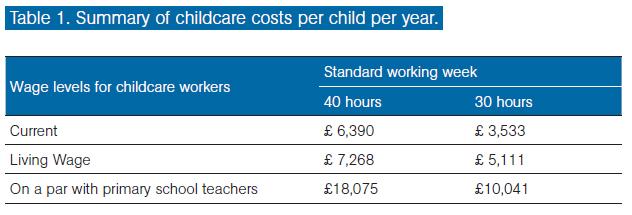The value of childcare
Quality, cost and time
12 February 2014
High quality childcare can help children to flourish, whatever their family circumstances. It can help parents to flourish, too, knowing that their children are being well-cared for while they go out to work.
But not everyone has access to high quality childcare, and this has far-reaching consequences for children, parents, and society as a whole. Unequal access to high quality, affordable childcare triggers and intensifies a range of income, gender, and social inequalities.
This report aims to stimulate a fresh debate about one of the most important issues facing our society: how best to care for our children. We propose three changes to help overcome inequalities and move towards better childcare for all.
1. Improve the quality of all formal childcare
High quality childcare is known to provide important cognitive and emotional benefits for all children, but especially for those from poorer backgrounds or whose parents have little education. The effects are strongest in children’s early years and benefits continue to be felt through school years and into adulthood.
We propose that high quality childcare can be achieved by increasing the wages of childcare workers and routes of progression within the sector. We present a sequence of stylised models which examine the financial implications of this, indicating the potential costs of providing full-time formal childcare (calculated on the basis of 45 hours per week for 52 weeks per year) for all children in England aged 6 to 36 months, at three different wage levels for childcare workers.
This cost would be £6,390 per child per year at current wage levels; £7,268 at a Living Wage (at 2012 rates); and £18,075 if childcare workers were paid on a par with primary school teachers. We also model the costs of this to households, which shows that the higher wage scenario would make full-time childcare unaffordable for most families without government support.
2. Move towards a standard 30-hour working week
Moving towards a shorter working week for all could ensure that paid and unpaid time is more evenly balanced between women and men and reduce inequalities. It could enable children and parents (fathers as well as mothers) to spend more time together, improve parents’ work-life balance, and help us all to live within environmental limits. Moving towards shorter hours will not be straightforward (e.g. the impact on workers’ earnings will need to be addressed), but we argue that the advantages of a shorter working week far outweigh the barriers to achieving it, enabling us to move towards a more sustainable economy and greater well-being for all.
The second stage of our financial modelling – summarised in Table 1 – demonstrates that a shorter working week would reduce the number of hours of formal childcare necessary. Thus, adopting a standard 30-hour working week could reduce the cost of providing full-time formal childcare for all children aged 6 to 36 months in England to £3,553 per child per year. If childcare workers were paid a Living Wage (adjusted upwards to take account of their reduced working hours), this cost would be £5,111; and if childcare workers were paid at the same level as primary school teachers, it would be £10,041.
If childcare workers were paid at the same level as primary school teachers, working a 30- rather than a 40-hour week would significantly improve the net disposable income of households paying the full costs of childcare (for all except dual earners on high incomes).

3. Make high quality childcare universally available
We propose that free, high quality childcare should be available for everyone. Our current system of childcare provision locks in a range of inequalities and perpetuates cycles of disadvantage, unfulfilled human potential and failure to flourish. These have very costly consequences, for individuals, for society as a whole, for the economy, and for the public purse. Physical and mental ill-health, poor learning, undeveloped skills, unemployment, substance misuse, social conflict, and criminal behaviour all trigger demand for services and benefits that could be avoided by tackling the underlying causes of disadvantage and inequality.
Since childcare can play a pivotal role in entrenching or reducing income and gender inequalities, public investment to raise quality and make it universally accessible will reap valuable returns to individuals, society, and the public purse. Public spending to make high quality childcare affordable to all must be seen as a vital investment in social and economic infrastructure.
Campaigns Parent-led childcare
Topics Health & social care Inequality Public services Childcare







